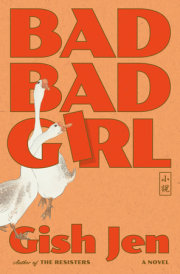Hattie I: I'll But Lie and Bleed Awhile
Last week, a family moved in down the hill-Cambodian. They plan to build themselves a little house, people say. Hoping that that house will-ta daah!-become a home. Well, that's not so simple, Hattie happens to know. But never mind; this is an age of flux. She, Hattie Kong, came from China; her neighbors from Cambodia; is there anyone not coming from somewhere? And not necessarily to a city with a cozy unhygienic ghetto, but sometimes-if not immediately, then eventually- to a fresh-aired town like Riverlake. A town that would have pink cheeks, if a town had cheeks. Riverlake being a good town, an independent town-a town that dates to before the Revolution. A town that was American before America was American, people claim-though, well, it's facing change now, and not just from the Cambodian family. Of course, there's always been change. In fact, if you want to talk about change, the old-timers will tell you how Riverlake wasn't Riverlake to begin with-how Brick Lake overflowed its banks a hundred years ago and came pouring down in a flood to here, and how the resulting body of water had to be renamed to avoid confusion. Riverlake, they dubbed it then-a lake born of a river. And the town that went with the lake was called that, too. Riverlake-a town born of change.
One thing will become another; and Hattie's neighbors are at least living for now in a double-wide trailer such as many around here would not sniff at. For some flatlanders bought property on the lake with this trailer on it; and seeing as they were going to build themselves a vacation place with radiant heat and a standing-seam roof, they gave the thing to the Cambodian family for free. Worked with the powers- that-be on the Internet, it seems. Had an interest in that part of the world, having marched-and marched and marched-against this and that in their youth. (As did Hattie, too, by the way, it wasn't such a big distinction.) The powers-that-be contacted a church, which in turn had the trailer moved to that triangle field at the bottom of the cliff behind Hattie. An odd lot the church was left in an odd will, and which odd lot the church has been trying to sell off for way longer than Hattie's been living in Riverlake, anyway. Which would be-what?- some two years now. Ever since Joe died and then Lee, in a kind of one- two Hattie still can't quite believe. It was like having twins; at one point they were even both in the recovery room together. She got to book the same church with the same pianist for both funerals, and did think she should have gotten some sort of twofer from the crematorium. And now, well, Come back, come back, she still begs them, in her half- sleep, sometimes. Come back. Come back. Though sometimes she's as mad at them as if they'd gone and had an affair on her.
How could you? How could you?
As if they could explain it.
And, What now? What now?
There being whole days, still, when she more or less lives to feed the dogs. Hers is a loneliness almost beyond words.
What now.
As dear Lee, that fountain of pith, used to say, The unlived life isn't worth living.
Her new neighbors.
And that lot, which was still the Lord's free and clear, awkwardly placed as it was-right in the crotch of a three-hill scrunch-up. It wasn't like Hattie's place, open and cleared and up on a granite knoll, with a little lake view. There was some clearing, but mostly the place was woods, and not the picturesque kind. These were real woods, impassable woods, with trees leaning and lying all over. A lot of sodden logs and lichen and toadstools, and even on the live trees, dead branches that stuck out all around the trunks like thorns. There was no view, and no light. And being sunk in a pocket like that, most of the clearing, aside from the trailer site proper, was wet. What the place really needed was divine intervention in the form of an in- ground dehumidifier. That did not, unfortunately, seem forthcoming. The good Lord did appear to be providing, though, if not for deliverance exactly, then a use for the place-about which, living as close as she did, Hattie was not thrilled. But, well, who could stop Him?
Hattie having heard that the church was going to do something someday, but having somehow envisioned that someday to be like the Rapture-a day that might or might not be on the immediate horizon. One week, though, the trailer sat as normal in its old site near town. The next its yard looked like a truck trade show. Hattie, out walking the dogs, stopped more or less dead as a churchload of folks jacked up the trailer and split it right down the middle, then with considerable adjusting and cranking and readjusting, opened it up like a child's pack-'n'-go dollhouse. Things snapped and sank; things leaned and bowed and split. This was not the growth of a crystal or a protein- some natural process bordering on dance. No, this was manmade inelegance itself. Still, only one worker swore (cussed to make the heavens blush, Hattie's mother would have said), namely baby-faced Everett, husband of Hattie's walking-group friend, Ginny. Whom someone had up and volunteered, unchurched though he was, on account of his size; never mind that the poor man was bound to incur more ambivalence than gratitude for his pain. Hattie knew him as a guy who would shovel her out in a storm-a man who'd show up without her asking and refuse to be paid, and a regular snow mason to boot, who over the course of the winter would produce path walls so plumb, you could have checked a spirit level against them. He was a kind man, an obliging man. And yet said kind and obliging man would not leave off cussing when people gave him the eye, quite the contrary. Said kind and obliging man seemed, if anything, to cuss all the louder for the looks-a man after Hattie's own heart in that way, but less dear to his coworkers, she could imagine, as the day wore on. For hear tell a jack gave, a hitch snapped. The coffee ran out. The cold got colder. One man just about took his thumb off, and had to go to Emergency with his hand in a bandanna tourniquet. So who knows but that Everett's mouth might have proved contagious-who knows but that he might have led others into Error-had the Lord not eventually gotten those trailer halves up on wheels.
There they were, though, finally, up up-at last-hallelu-jah! The group disbanded; heathen Everett disappeared. Then down the road the trailer halves rolled, one after the other, their private parts all in public. Did not a body have to wonder how intelligently designed we can be when none of us has so much as a wheel-like option? Well, never mind. The most intriguing part of all this, to Hattie's mind, had nothing to do with the brute grunting and heaving-ho-or even the dawning realization that the halves were headed toward her house. (Which was not intriguing, by the way-which was a shock!) It was rather when one of the trailer halves passed her on the road. For in the kitchen, as it rumbled by, was a blink of a girl, holding up the cabinets. Young- fourteen or fifteen, Hattie guessed-a tea-skinned pipsqueak of a thing with a swingy black ponytail and a shocking-pink jacket. Some cabinets had gotten knocked loose when the work was being done; the girl was put in there, it seemed, to keep them from coming down completely. Never mind that her spindly legs were wholly inadequate for the job- there she was all the same, gamely holding them up. Having taught high school for the better part of her life, Hattie waved at the poor thing; this being one of the things teaching's made of her, besides a habitual hoarder of chalk: a compulsive supporter of gumption. True, she'd retired right after Joe and Lee died. (As she had had to, being unable to bear the campus at which they'd all taught-being unable to climb the hill with the crocuses, or to set foot in the teachers' lounge, anything.) But never mind. That the girl did not wave back is the thing-that she could not begin to think about waving back, probably. Still, Hattie waved anyway-as the girl might never have even noticed, had the trailer not happened to hit a pothole.
A well-known pothole, this was, more famous in these parts than any movie star. It was top of the summer list for the road repair crew-a gap big enough to make you fear for your car axle. If locals had drawn up the map, this thing would have been on it in red. But that driver hailing from parts unknown, he failed to slow down-making for a jolt. The top of the trailer tilted like a fair ride; the girl was slammed askew. She lost her footing; a door sprang open; some cabinets tore off and a drawer shot out, sailing with surprising aplomb out onto the road, where it landed, spinning.
"Help!" the girl shouted.
"I've got it!" Hattie called back.
Did the girl hear? In any case, as the trailer pulled back level, the dogs and Hattie went and rescued the drawer-a wood-veneer affair, with a pitted, copper-tone, Mediterranean-look pull. Empty. The sort of thing you don't even see as a thing unless it's lying in the road and about to get run over. The dogs sniffed it immediately, of course. Wise Cato dropping his tail even as Annie the puppy attacked it; Reveille the glutton nosed an inside corner. For the thing did smell of cinnamon-someone's ex-spice drawer, guessed Hattie, as she picked it up. A thing worth something on its own, but a thing you'd have to say had suffered a loss, too. Its fellow drawers, after all-not to say all the cabinetry it had ever known.
Ah, but what has happened to her that she can find herself feeling sorry for a kitchen drawer?
Hattie gone batty!
Anyway, there the thing was, still in one piece.
She would have brought it back the very next day, except for the rain attack-these huge drops leaving the sky with murderous intent. Anyone foolish enough to pit an umbrella against them would only meet defeat even before the onslaught turned, like this one, into something resembling concrete aggregate. Of course, it will let up soon enough. Soon enough, Hattie's friend Greta will be whizzing by again, her white braid flying and her back baskets full-honking Hi! at Hattie's house, midwestern-style, as if to remind her of the music series, the dam project, the water quality patrol! So many ways to Get Involved, so many ways to Prove an Exemplary Citizen!
For a blessed few days, though, Hattie the Less Exemplary sits painting bamboo. One stalk, two.
Wind. Sleet. Hail.
She dips her máobi in the ink.
Rain.
Until finally comes a big blue sky, solid as wallboard.
Hattie admires the mountains as she crosses her side yard-the mountains in Riverlake being neither the highest hills around, nor the most dramatic, but quite possibly the most beguiling. Folding into one another like dunes, if you can imagine dunes dark with trees and sprinkled with farms. The west side of the lake, where Hattie lives, tends to the plunging and irregular-irrepressible granite heaves with drifts of unidentified other matter in between. (Including, this time of year, a few last gray amoebae of snow.) The east side, though-which she can see from her side yard and back porch-is rolling and dotted with some of the big old farms that used to be everywhere around here. They're squares of spring green today, like handkerchiefs dropped down from someplace they use green handkerchiefs; Hattie likes the barns, especially. It's hard to say why plain nature would be improved by a red barn or two, but she does feel it so. Maybe it is just the Chinese in her, always partial to the civilized, but she likes silver-capped silos, too, and farmhouses.
Peace.
Though look what's floating from the crest of the hill today: the trial balloon for the proposed cell phone tower. A long long string with a white balloon bobbing at its top-the whole deal a-waft like a ghost in a kids' play now, but just wait until it's a lunky metal affair with trusses and uprights and baubled appendages. There's a family hoping to make a killing on the thing, people say, as well as a big select board meeting on the subject coming up, to which-meeting-ed out as she was by her fervent youth-even Hattie will go.
But first, her neighbors.
The land is a swamp, but the trailer site itself isn't bad. As nobody has built steps up to the front door yet, though, she has to step up onto a milk crate to knock, and even so finds herself knocking at the door's knees. An awkward thing to do while holding a drawer, especially if you have a bag of cookies set in the drawer, as she does- butterscotch chip, nothing too extraordinary, though Hattie did use turbinado sugar in them instead of regular, seeing as how it was on special one week. Whatever turbinado even is or means. Anyway, the sugar gave the cookies a chew; and now here the door is opening, with a scrape-a half-gone hinge. The air has the mushroomy smell of rot.
"Hello," she says from her pedestal. She hoists the drawer before her like a popcorn vendor at a baseball game. "I've come to welcome you to the neighborhood."
Her audience being a half-stick of a man-looming over her at the moment, but not actually much taller than she is, which last she dared measure was all of five foot two. He has on a blue buttoned-up polo shirt, a black leather belt, and blue denim pants that look as though they are meant to be jeans but somehow look like slacks. His hair is white and thin, his skin pale and loose, and his face the fine result, she guesses, of a Pol Pot facial: One of his cheekbones sits a half- step high. She shivers. The man's nose is likewise misaligned; his pupils are tiny; and his gaze has a wander, as if possessed of a curiosity independent of its owner. Nystagmus, she thinks-damage to the abducens nerve. (Recalling old science terms more easily than she recalls her grocery list, naturally.) His gaze lists left, like a car out of alignment, then jerks back-left left left again, and back. It is strange to think him around her age-younger than her, even. Mid- sixties, people have said. He looks, she thinks, to belong to his own reality; and who knows but that he thinks something similar of her, for he beholds her with a blankness so adamant that the closed door he's replaced does seem, in retrospect, to have been friendlier.
Copyright © 2011 by Gish Jen. All rights reserved. No part of this excerpt may be reproduced or reprinted without permission in writing from the publisher.




































































































